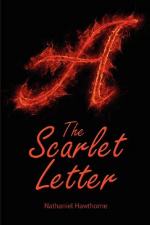The somewhat dim coal fire has an essential Influence in producing the effect which I would describe. It throws its unobtrusive tinge throughout the room, with a faint ruddiness upon the walls and ceiling, and a reflected gleam upon the polish of the furniture. This warmer light mingles itself with the cold spirituality of the moon-beams, and communicates, as it were, a heart and sensibilities of human tenderness to the forms which fancy summons up. It converts them from snow-images into men and women. Glancing at the looking-glass, we behold—deep within its haunted verge—the smouldering glow of the half-extinguished anthracite, the white moon-beams on the floor, and a repetition of all the gleam and shadow of the picture, with one remove further from the actual, and nearer to the imaginative. Then, at such an hour, and with this scene before him, if a man, sitting all alone, cannot dream strange things, and make them look like truth, he need never try to write romances.
But, for myself, during the whole of my Custom-House experience, moonlight and sunshine, and the glow of firelight, were just alike in my regard; and neither of them was of one whit more avail than the twinkle of a tallow-candle. An entire class of susceptibilities, and a gift connected with them—of no great richness or value, but the best I had—was gone from me.
It is my belief, however, that had I attempted a different order of composition, my faculties would not have been found so pointless and inefficacious. I might, for instance, have contented myself with writing out the narratives of a veteran shipmaster, one of the Inspectors, whom I should be most ungrateful not to mention, since scarcely a day passed that he did not stir me to laughter and admiration by his marvelous gifts as a story-teller. Could I have preserved the picturesque force of his style, and the humourous colouring which nature taught him how to throw over his descriptions, the result, I honestly believe, would have been something new in literature. Or I might readily have found a more serious task. It was a folly, with the materiality of this daily life pressing so intrusively upon me, to attempt to fling myself back into another age, or to insist on creating the semblance of a world out of airy matter, when, at every moment, the impalpable beauty of my soap-bubble was broken by the rude contact of some actual circumstance. The wiser effort would have been to diffuse thought and imagination through the opaque substance of to-day, and thus to make it a bright transparency; to spiritualise the burden that began to weigh so heavily; to seek, resolutely, the true and indestructible value that lay hidden in the petty and wearisome incidents, and ordinary characters with which I was now conversant. The fault was mine. The page of life that was spread out before me seemed dull and commonplace only because I had not fathomed its deeper import. A better book than I shall ever write was there; leaf after leaf presenting itself to me, just as it was written out by the reality of the flitting hour, and vanishing as fast as written, only because my brain wanted the insight, and my hand the cunning, to transcribe it. At some future day, it may be, I shall remember a few scattered fragments and broken paragraphs, and write them down, and find the letters turn to gold upon the page.




